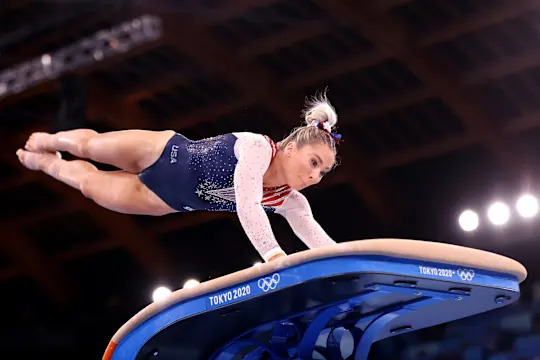CELEBRITY
Former Olympic gymnast MyKayla Skinner transformed controversy into advocacy, joining XX-XY Athletics to protect women’s sports after public disputes with teammates.

From Gymnastics to Advocacy: MyKayla Skinner’s Transformation
MyKayla Skinner, an American gymnast who made her Olympic debut at the 2021 Tokyo Games, emerged as one of the sport’s resilient figures. She captured the silver medal on vault for the U.S. team and solidified herself as a high‑level competitor.
Her journey to that medal was not without complexity: Skinner was selected in a unique “non‑nominative” spot for the 2021 U.S. team (meaning she competed as an individual athlete rather than one of the four made for the team event).
The controversy that preceded her advocacy
Skinner’s transition from gymnast to outspoken advocate was shaped by a series of public disputes and internal tensions:
In 2024, Skinner made remarks critical of the upcoming U.S. women’s gymnastics squad, questioning what she perceived to be a “lack of work ethic.” These comments triggered backlash from within the gymnastics community.
In June 2025, Skinner publicly accused her former teammate, Simone Biles, of having “belittled, dismissed, and ostracized” her during their time together on Team USA. She issued a statement saying:
“Throughout my own career, I endured being belittled, dismissed and ostracized behind the scenes by Simone.”
The catalyst for the public dispute was the broader—and very heated—debate over transgender athletes’ participation in women’s sports, in which Skinner sided with conservative activist Riley Gaines and criticized the approach taken by Biles.
The pivot: Joining XX‑XY Athletics
In October 2025, Skinner announced her affiliation with XX‑XY Athletics, a sportswear brand that explicitly aligns itself with the movement to protect what it defines as “women’s sports” based on biological sex.
As part of the “Gold Medal Campaign” under the brand, Skinner declared:
“Finding my voice has been hard — there’s no training for that … this is for my daughter.”
Her involvement with XX‑XY Athletics signals a shift: from internal athlete disputes to a public advocacy role. The brand itself is structured to support “female‐only spaces” and provides scholarships and awards through its “Courage Wins Award” fund.
Independent Women
+1
What this means: themes, implications, and responses
Advocacy rooted in lived experience
Skinner’s decision to speak out and affiliate with XX‑XY appears deeply personal: as a new mother (her daughter was born in September 2023), she frames her advocacy as safeguarding the future of female athletes and women’s sport.
The fairness vs inclusion debate
The core of the debate centers around competing philosophies:
Skinner and her new alignment argue that inclusion of male‑bodied (or XY‑identified) athletes in female categories undermines competitive fairness for biologically female athletes.
CommsTrader
+1
Others (including Biles in her apology) maintain that sports must balance equity and inclusivity, and that the system currently fails to do so adequately.
Internal culture and athlete voices
By going public about her experiences with Biles and her former teammates, Skinner is raising broader questions about team culture, athlete mental health, and the power dynamics in elite sport. Her statement that the “pressure to stay silent was immense” suggests she sees power in athlete voices being heard.
EssentiallySports
Public and professional reaction
Her transition into advocacy has met mixed responses:
Supporters see her move as courageous and timely, giving voice to a perspective many female athletes feel is marginalized.
Critics raise concerns about the framing of the debate, potential exclusion of trans athletes, and the brand’s affiliation with polarising causes. For example, XX‑XY’s advertising campaign was banned by TikTok for “offensive content”.
New York Post
What to watch going forward
How her advocacy evolves: Will Skinner limit herself to brand messaging, or will she engage directly in policy, sport‑governance debates, and athlete representation?
Impact on gymnastics and wider women’s sport: Her prior conflict with elite teammates signals that even within women’s sport, there are deep divisions. How this affects team dynamics, athlete representation and dialogue remains to be seen.
Brand influence: With her partnership, XX‑XY Athletics gains a recognizable Olympic athlete to front its message — that may amplify its reach and influence.
Broader sport governance: As debates about transgender participation in sport remain highly contentious, Skinner’s role positions her at the intersection of sport performance, policy and culture.
Conclusion
MyKayla Skinner’s journey from elite gymnast to outspoken advocate showcases how athletes increasingly leverage their platforms beyond competition. Her story encapsulates the intersections of personal experience, sport culture, gender, fairness and public debate. Whether one agrees or disagrees with her stance, her transition speaks to a broader shift: athletes are less willing to remain silent on systemic issues. With her alignment with XX‑XY Athletics, Skinner has stepped fully into the advocacy arena and in doing so, opened new lines of conversation about what it means to protect women’s sport in the 21st century.










